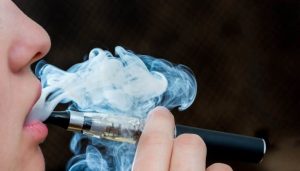
CBD vape manufacturers and retailers in Germany will face a marketing and regulatory minefield starting in January because of recent changes to the country’s tobacco law.
Under legislation passed by the German Bundestag on July 2, non-nicotine e-cigarettes and refillable containers will be regulated the way that their nicotine counterparts are, and additional advertising restrictions will apply to all vaping products, regardless of nicotine content.
The new advertising restrictions will apply to:
- Outdoor advertising.
- Advertising played before some films.
- Free samples.
That also changes on Jan. 1, 2021, when the new legislation takes effect.
THC products in Germany are considered narcotics and fall under different rules entirely.
“Many of my clients offer CBD-containing liquids for e-cigarettes and are concerned about the changes,” said Julia Seestaedt, a Hamburg-based attorney for the cannabis industry.
“At the moment, manufacturers and retailers are most concerned about the comprehensive advertising ban associated with the change,” Seestaedt added.
According to Peter Homberg, who heads the European cannabis practice for Dentons Europe LLP in Berlin, the new legislation is just one facet of an increasingly restrictive market for all CBD products in Germany.
“German regulation is very strict on CBD products, and it is to be expected that this will not change in the future,” Homberg said.
The German CBD retail landscape, he said, is markedly different than in the U.S.
“It’s not as free as in the U.S. It is a very wide-open liberal market in the U.S., but we don’t have that here in Germany, despite the fact that there are products available on the market.”
Reporting requirements
Under the EU’s Tobacco Products Directive, manufacturers and importers of nicotine-containing e-cigarettes have been obligated to notify national authorities on their products’ ingredients and emissions, toxicological data, nicotine content and uptake, and a description of the device and production processes.
The EU guidance regulates the ingredients that can be used in e-cigarettes and the sets stricter limits nicotine content than the United States does. Some speculate that stricter oversight on vape ingredients may be one reason why the 2019 U.S. ‘vape crisis’ did not hit Germany or other parts of Europe.
Late last year, German authorities looked at 167 cases of recent poisoning and suspected poisoning connected to e-cigarettes. More than 90% of those cases had patients with no symptoms or mild symptoms after inhaling the vapor; only two cases were deemed severe or life-threatening, and these were only as a result of swallowing an e-liquid.
With Germany set to put non-nicotine vapes on equal footing with their nicotine counterparts, these rules will soon apply to CBD vape manufacturers as well.
Subjecting nicotine-free vape products to the same requirements and restrictions as their nicotine counterparts was “necessary to protect consumers from damage to their health,” the draft text reads.
Under the new legislation, CBD e-cigarette manufacturers will be obligated to notify authorities about their product’s contents, manufacturing process and other details. Companies with CBD vape products already on the market when the law takes effect on Jan. 1 will have until July 1 to submit the necessary documents.
This change is “not so much a restriction but rather a considerable financial expense,” Seestaedt said. “In the future, products may only be released on the market after the notification and a six-month waiting period.”
CBD manufacturers should familiarize themselves with the new, more stringent regulations regarding vape product package inserts, the attorney added.
New limits on advertising
Lawmakers wrote that the new advertising bans for CBD and other non-nicotine vape products were created in part to shield children from their influence.
The legislation’s new restriction on outdoor advertising dictates that ads can be displayed only in shop windows or on exterior walls at retail stores that sell the products in question.
This means that “manufacturers will no longer be able to advertise nicotine-free CBD vapes on sidewalk advertising columns or billboards,” Seestaedt noted.
At movie theaters, no advertising for vapes or e-liquids can be shown prior to films for children – specifically, films that have an age restriction. Free samples will also be banned.
The changes are set to take effect beginning on Jan. 1, 2021, though outdoor advertising restrictions don’t take effect until 2024.
“As it is often the case, the devil is in the details,” Seestaedt noted. “Only e-cigarettes and refill containers are affected by the new law. Long-fills and classic flavor concentrates may be excluded from the regulation in some circumstances.”
Non-nicotine e-cigarettes or refillable containers that were manufactured or placed on the market and labelled before Jan. 1, 2021 and complied with earlier provisions may remain on the market until March 31, 2021, according to the legislation.
Monica Raymunt can be reached at [email protected]

